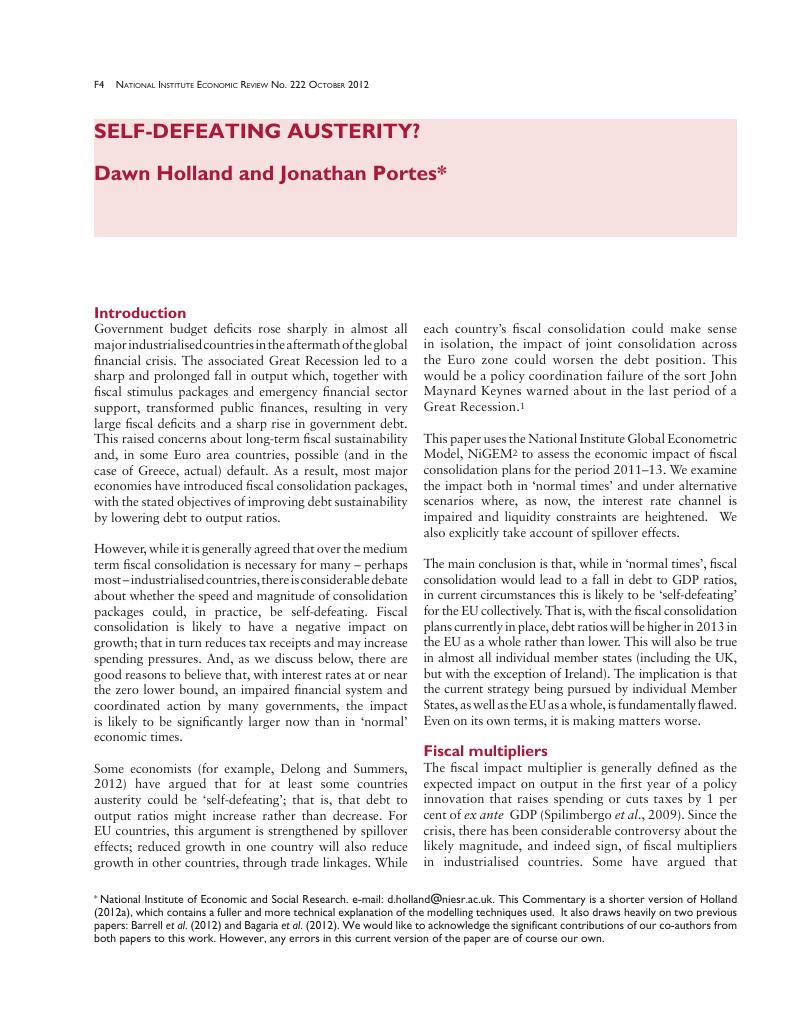Crossref Citations
This article has been cited by the following publications. This list is generated based on data provided by Crossref.
2012.
Prospects for individual economies.
National Institute Economic Review,
Vol. 222,
Issue. ,
p.
F17.
Crafts, Nicholas
2013.
Returning to Growth: Policy Lessons from History*.
Fiscal Studies,
Vol. 34,
Issue. 2,
p.
255.
Chowdhury, Anis
and
Islam, Iyanatul
2013.
Beyond Macroeconomic Stability.
p.
72.
Panizza, U G O
2013.
The Origins and Resolution of Debt Crises: It Is Not Always Fiscal!.
Comparative Economic Studies,
Vol. 55,
Issue. 3,
p.
431.
Laskos, Christos
and
Tsakalotos, Euclid
2013.
Greek Neo-liberalism in Fat and Lean Times.
Pôle Sud,
Vol. n° 38,
Issue. 1,
p.
33.
Goulas, Eleftherios
and
Zervoyianni, Athina
2013.
Growth, deficits and uncertainty: Theoretical aspects and empirical evidence from a panel of 27 countries.
The Quarterly Review of Economics and Finance,
Vol. 53,
Issue. 4,
p.
380.
Fiorentini, Riccardo
and
Montani, Guido
2013.
Beyond Austerity: A European Recovery is Feasible.
SSRN Electronic Journal,
Mathieu, Catherine
and
Sterdyniak, Henri
2014.
Redemption?.
Revue de l'OFCE,
Vol. N° 132,
Issue. 1,
p.
51.
Illing, Gerhard
and
Watzka, Sebastian
2014.
Fiscal Multipliers and Their Relevance in a Currency Union – A Survey.
German Economic Review,
Vol. 15,
Issue. 2,
p.
259.
Blot, Christophe
Cochard, Marion
Creel, Jérôme
Ducoudré, Bruno
Schweisguth, Danielle
and
Timbeau, Xavier
2014.
Fiscal consolidation in times of crisis: is the sooner really the better?.
Revue de l'OFCE,
Vol. N° 132,
Issue. 1,
p.
159.
Sideris, Dimitrios
2014.
Comment on “How the Euro Crisis Evolved and How to Avoid Another: EMU, Fiscal Policy and Credit Ratings”.
Journal of Macroeconomics,
Vol. 39,
Issue. ,
p.
375.
Moschella, Manuela
2014.
Monitoring Macroeconomic Imbalances: Is EU Surveillance More Effective than IMF Surveillance?.
JCMS: Journal of Common Market Studies,
Vol. 52,
Issue. 6,
p.
1273.
Armingeon, Klaus
and
Guthmann, Kai
2014.
Democracy in crisis? The declining support for national democracy in European countries, 2007–2011.
European Journal of Political Research,
Vol. 53,
Issue. 3,
p.
423.
Salomon, Margot E.
2015.
Of Austerity, Human Rights and International Institutions.
SSRN Electronic Journal,
Crafts, N.
and
Mills, T. C.
2015.
Self-defeating austerity? Evidence from 1930s' Britain.
European Review of Economic History,
Vol. 19,
Issue. 2,
p.
109.
Fritz, Barbara
Dullien, Sebastian
and
Mühlich, Laurissa
2015.
Le FMI à la rescousse : la zone euro a-t-elle bénéficié de l’expérience du fonds dans la lutte contre les crises ?.
Économie et Institutions,
Godar, Sarah
Paetz, Christoph
and
Truger, Achim
2015.
The scope for progressive tax reform in the OECD countries.
Revue de l'OFCE,
Vol. N° 141,
Issue. 5,
p.
79.
Blot, Christophe
Cochard, Marion
Creel, Jérôme
Ducoudré, Bruno
Schweisguth, Danielle
and
Timbeau, Xavier
2015.
Fiscal Consolidation, Public Debt and Output Dynamics in the Euro Area: lessons from a simple model with time-varying fiscal multipliers.
Revue d'économie politique,
Vol. Vol. 124,
Issue. 6,
p.
953.
Rannenberg, Ansgar
Schoder, Christian
and
Strrskk, Jan
2015.
The Macroeconomic Effects of the Euro Area's Fiscal Consolidation 2011-2013: A Simulation-Based Approach.
SSRN Electronic Journal,
Clift, Ben
2015.
The British Growth Crisis.
p.
151.



